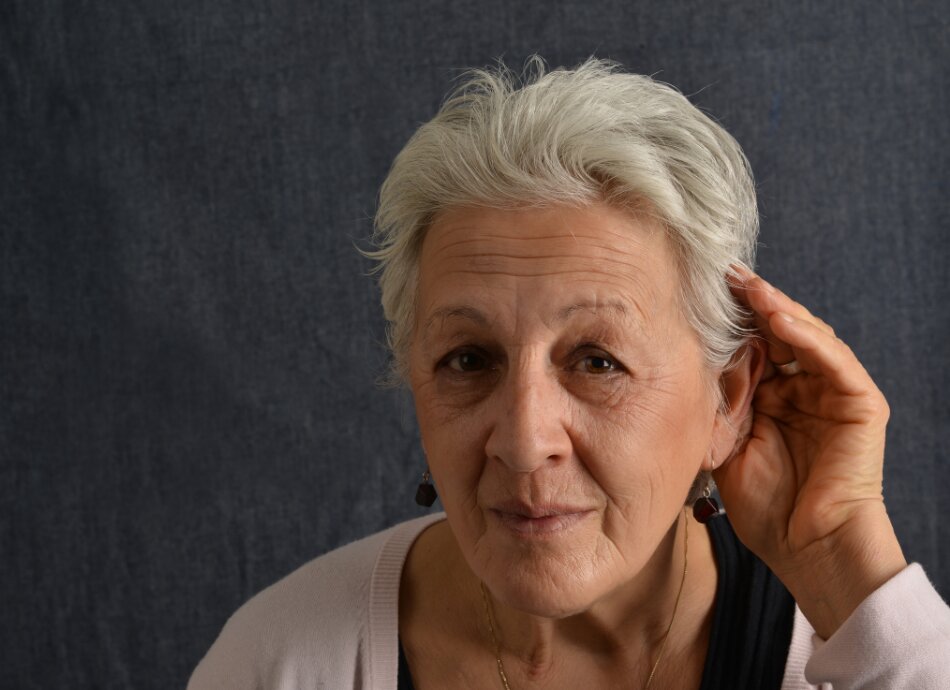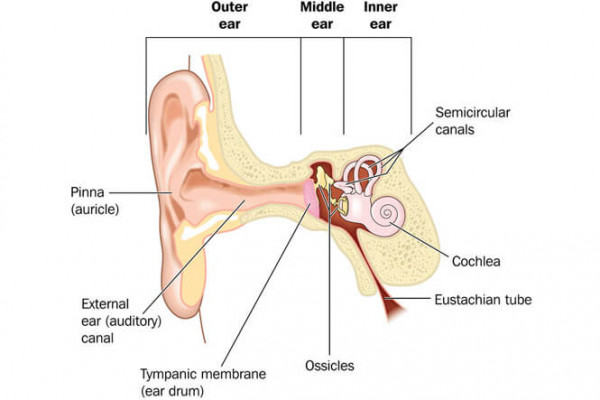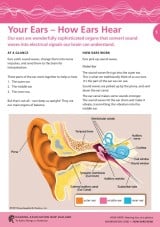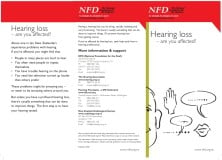You can now add Healthify as a preferred source on Google. Click here to see us when you search Google.
Hearing loss in adults | Kore whakarongo i roto i te hunga pakeke
Key points about hearing loss (hakiri, hauora turi or taringa turi) in adults
- Hearing loss is common and can develop at any stage of your life, but most often happens as you get older.
- Many hearing problems develop slowly over time and other people may notice your hearing loss before you do.
- You generally can't recover your hearing, it mostly remains stable or deteriorates over time.
- Hearing loss can be caused by illness, accident, over-exposure to noise, some medications, misuse of drugs, trauma, genetics or simply getting older.
- Half of all hearing loss can be easily prevented or treated.
- See your healthcare provider urgently if you have sudden loss of hearing.

Hearing loss (hakiri, haurua turi, or taringa turi) is when you can't hear as well as somebody with normal hearing. Hearing loss can vary in severity, ranging from mild, moderate, severe to profound. It can affect both ears, usually to the same degree. However, in some cases, it may only affect one ear.
Anyone can develop hearing loss, but it most often happens as you get older. Many hearing problems develop slowly over time and other people may notice your hearing loss before you do. You generally can't get your hearing back once it starts to deteriorate. However, there are ways to improve hearing.
Hearing loss can be caused by:
- Aging: Your inner ear function can deteriorate over time.
- Over exposure to noises at work: Constant exposure to loud noises can lead to permanent damage to your inner ear.
- Over exposure to noises at play: Exposure to loud noises from the use of power tools during your DIY projects, riding motorcycles or listening to loud music can also cause permanent damage inside your ear.
- Loud noise: Permanent damage to your inner ear can occur by exposure to loud noises over time. But exposure from a short blast of very loud noise, such as an explosion or a gunshot can also cause permanent irreversible immediate damage to the hair cells in the inner ear, resulting in a permanent degree of hearing loss.
- Genetics: Some genes may make you more likely for damage to occur in your ears from ageing and/or noise exposure.
- Some medicines: While very high doses of aspirin and loop diuretics can cause affect hearing in the short-term, certain medications (eg, those used for treating cancer) can cause permanent damage inside your ear. Many medications can also result in the side effects of ringing in the ears, otherwise known as tinnitus.
- Some illnesses: Serious medical conditions including meningitis, mumps and measles can result in inner ear damage.
- Accidents: Physical trauma to your ear and/or skull can disconnect and/or fracture the middle/inner ear, resulting in permanent hearing loss.
About a third (1 in 3) of people over 65 years of age have hearing loss that affects their daily lives.
The outer part of your ear is designed to move sound from the air into your ear canal. Sound waves are changed into mechanical vibrations at your eardrum.
Your eardrum is attached to 3 bones that boost sounds while moving them through your middle ear. The last of these bones is attached to an oval window with a thin tissue cover. This is the entry to your inner ear, also known as the cochlea.
The cochlea is a fluid filled snail-shaped tube. It contains thousands of sensory hair cells on a flexible membrane. When the oval window vibrates, the membrane and sensory hair cells move, turning sound vibrations into electrical signals. The outer hair cells boost soft sounds and dampen loud sounds. The inner hair cells transfer sound information to your auditory (hearing) nerve, which then transfers the electrical signals to your brain. Your brain turns these electrical signals into sound for you to process and make meaning of it.

Image credit: 123rf
The video below explains how hearing works.
Video: Journey of sound to the brain
(National Institutes of Health, US, 2018)
There are 3 main types of hearing loss in adults.
Conductive hearing loss
Conductive hearing loss involves the outer and/or middle ear, where something gets in the way of sound information moving through your ear as described above. It can be due to blockage or damage to your ear canal, ear drum or the bones of your middle ear. This type of hearing loss may be temporary (eg, from ear wax build up in the ear canal) or permanent (eg, due to malformation of the middle ear bones). If you have conductive hearing loss you may find sounds and speech at normal conversation level too muffled or quiet, as if you're wearing ear plugs.
Sensorineural hearing loss
Sensorineural hearing loss occurs when the sensory hair cells in your inner ear are not properly formed or become damaged, or there may be a problem with your hearing nerve (also known as the auditory nerve). Depending on where the damage occurred, this type of hearing loss may reduce the clarity as well as the loudness of sound. It can also affect how the sound is processed, making speech difficult to understand.
Mixed hearing loss
Hearing loss can also be caused by a combination of both conductive and sensorineural hearing loss.
A less common type of hearing loss is called auditory process disorder. This doesn't cause loss of loudness or clarity, but it can cause problems with understanding what you hear.
Conductive hearing loss can be caused by:
- too much earwax in your ear canal
- fluid behind your eardrum
- a perforated (ruptured or burst) eardrum
- abnormal growth of the hearing bones in your middle ear (otosclerosis)
- physical trauma to your ear and/or skull.
Sensorineural hearing loss can be caused by:
- ageing where the condition of the hair cells in the inner ear deteriorates, and hearing, especially high pitch consonants, become more difficult
- exposure to excessive and/or impulse noise, which causes more hearing loss in specific pitches than you would have from ageing alone
- conditions affecting your hearing nerve and brain.
Other causes of hearing loss include:
- one of your whānau members having a genetic hearing impairment or being Deaf
- alcohol, nicotine, carbon monoxide or exposure to solvents
- medications, including some antibiotics, pain relief medicines and diuretics (water pills)
- illness such as meningitis or untreated ear infections
- trauma from objects beings poked into an ear, sports, other head injuries or occasionally, changes in air pressure when flying or diving.
You're likely to be experiencing hearing loss if you:
- often think people are mumbling
- often don’t hear something the first time
- have to ask others to repeat what they've said clearly, loudly and slowly
- have trouble understanding words, especially in crowded and noisy places
- pretend to understand something because you didn’t hear it
- have had someone else comment on your hearing
- turn the TV or radio up louder than other people do
- find it difficult to hear others on the phone and have to turn up the volume or put the person on speaker phone
- have become less tolerant of noise around you
- have tinnitus
- find social situations hard or avoid them altogether
- notice a difference in how well you hear in each ear
- feel like one or both of your ears are blocked.
To see how good your hearing is, take this online hearing test(external link) or answer the following questions.
- Do you often need to ask people to repeat what they have said?
- Do you have trouble understanding a conversation or mishear people in a group or when there’s background noise?
- Does it seem that people are regularly not speaking clearly or are mumbling?
- When watching television do you need to have the volume higher than other people to hear comfortably?
- Do you become frustrated or even totally avoid some social occasions because there is too much noise or because you cannot keep up with the conversation?
- Do you get tired or stressed after you’ve been listening to, or taking part in, a conversation for a long time?
- Do you find you need to be close to the person speaking at meetings, seminars, restaurants or in religious services to understand what they're saying?
- Do you need to maintain eye contact or see people’s faces to understand what they are saying?
- Do you find it difficult to work out where sounds are coming from?
- Have your family or friends asked whether you have a hearing problem?
If you answer 'yes' to any of the questions above, see your healthcare provider who can arrange a hearing assessment for you.
Apps reviewed by Healthify
You may find it useful to look at some hearing test apps.
If you have sudden hearing loss, see your healthcare provider urgently.
If your hearing loss is not sudden or if you, or other people, notice that your hearing is getting worse, see your healthcare provider. They will refer you to an audiologist who will carry out tests to measure your hearing and check for any middle ear problems. You may also wish to go directly to an audiologist or hearing therapist to have your hearing checked. There is no charge to see a hearing therapist and you may be able to get financial assistance to see an audiologist. You can use this link to find your nearest audiologist(external link) and this link to find your nearest hearing therapist.(external link)
The treatment of your hearing loss will depend on what's causing it. It’s important to seek treatment as scientific evidence suggests that people who leave their hearing loss untreated are more at risk of developing dementia.
Temporary hearing loss
Your doctor or nurse can treat earwax build-up with ear drops, syringing or other methods. Read more about earwax and how it's removed. Syringing should be avoided if you often get ear infections and/or you have a perforated ear drum. It can also make some people dizzy.
If you have an ear infection, your healthcare provider may prescribe medicine to treat it.
Long-term hearing loss
Hearing aids can be effective in treating permanent conductive, mixed or sensorineural hearing loss. However, it's important to have a thorough discussion with an audiologist, who can help you choose the most appropriate hearing aid(s) based on the type and severity of your hearing loss, as well as your hearing needs. Additional hearing accessories may also be recommended, depending on your hearing needs.
Otosclerosis (abnormal growth of the hearing bones in your middle ear) is sometimes treated by surgery or through the use of hearing aids.
Find out about funding for hearing aids(external link).
Surgery isn't usually helpful if you have a sensorineural hearing loss. Exceptions are cochlear implants if you have profound sensorineural hearing loss, and bone-anchored hearing aids (BAHAs) if you have a significant amount of conductive hearing loss or sometimes with mixed hearing loss, where traditional hearing aids can't be worn. Your audiologist and ear, nose and throat (ENT) specialist will be able to recommend surgical options if they're appropriate for your hearing loss.
Video: Is a cochlear implant right for me?
(The Pindrop Foundation, NZ, 2021)
Here are some things that may help if you have hearing loss:
- Wear hearing aids if you have them – wearing your hearing aids every day will optimise you brain’s ability to process and make sense of sounds and speech. You will have more energy and be able to enjoy life far more if you can hear what’s going on rather than having to guess what you have heard. Hearing loss is one of the risks for dementia and the risk can be lowered by wearing hearing aids. Read more about reducing your risk of dementia.
- Talk to your audiologist if your hearing aids are uncomfortable or hurting your ears. Simple modifications to your hearing aids and ear moulds can often be done at your local audiology clinics.
- Let people know that you have hearing loss and the best way they can communicate with you. They may need reminding if they forget.
- Ask people to stand or sit where you can see them and hear them best.
- Ask them to remove anything that covers their mouth, including their hand or facemask if it's appropriate and safe to do so.
- Don’t pretend to know what someone is saying to you if you don’t.
- Ask people to rephrase things, write them down or send you a text message/email instead if you can't make out what they're saying.
Here are some things to try if your hearing is better in one ear than the other:
- Let people know that you hear better in one ear than the other.
- Make sure people sit or walk on your good side.
- If your affected ear is on the passenger side of your car when you're driving, it might be helpful to ask your passenger to sit behind you, rather than beside you.
- Position your better ear towards the speaker, rather than towards other noise such as the coffee machine.
There are products and services (eg, sound amplifiers for your phone, the NZ Relay Service, TV captioning, and alerting devices) that can help if you have hearing loss. Find out more about these products(external link) and services(external link).
The best way to protect your hearing is to completely avoid exposure to very loud noise and to limit the amount of time you are exposed to loud noise.
Protecting your hearing may also slow down how quickly you develop age-related hearing loss.
Noise is likely to be harmful when:
- it's as loud or louder than heavy city traffic
- you have to raise your voice to speak to someone a metre away
- things sound different after being exposed to the noise
- you hear ringing or other noises in your ears after the noise exposure – ringing in your ears or muffled hearing is a warning sign you may not looking after your hearing well enough.
Things you can do to prevent hearing loss
- Wear noise cancelling headphones.
- Use personal ear protection at work including earmuffs.
- Keep music at a moderate level.
- Stay away from speakers at concerts and wear earplugs if the music is overly loud.
- Take breaks from listening to loud music.
- Don’t poke anything in your ears and don’t use ear candles.
- Use earplugs when swimming.
- Swallow, chew gum or yawn to manage changes in air pressure when you're flying.
- Have hearing checks if you think you might have any hearing loss.
Read more about how to protect your hearing.
Hearing New Zealand(external link) An organisation to improve the quality of life for people with hearing loss.
National Foundation for Deaf and Hard of Hearing(external link) An organisation that promotes the rights, interests and welfare of New Zealanders with hearing loss.
Deaf Aotearoa(external link) A national organisation representing the voice of Deaf people, and the national service provider for Deaf people in Aotearoa New Zealand.
The Pindrop Foundation NZ(external link) A voice for New Zealand adults who are affected by a severe hearing loss and need a cochlear implant to restore their hearing.
NZ Audiology Society(external link) Audiologists are specialists at diagnosing hearing problems and the non-medical treatment of hearing loss.
Hearing Dogs NZ(external link) Hearing Dogs NZ is an independent charitable trust that assesses, selects, trains and places Hearing Dogs with deaf and severely hearing impaired New Zealanders. Hearing Dogs are placed at no charge to the deaf person receiving the dog.
Funding
There is funding for hearing aids(external link) available. There are also lots of products that can improve your quality of life with hearing loss, such as telephones, TV and telephone amplifiers and personal listening devices. Find out ore about deaf or hearing loss equipment for adults(external link).
Healthcare providers
Find your nearest audiologist(external link)
Find your nearest hearing therapist(external link)
The following links provide further information about hearing loss. Be aware that websites from other countries may have information that differs from New Zealand recommendations.
Hearing loss(external link) Patient Info, UK
Otosclerosis(external link) Patient Info, UK
Hearing and vision services(external link) Whaikaha | Ministry of Disabled People, NZ
Deaf or hearing loss equipment for adults(external link) Whaikaha | Ministry of Disabled People, NZ
Noise – what's the problem?(external link) WorkSafe, NZ
Brochures
Hearing New Zealand(external link) has information cards(external link) on hearing-loss related topics such as causes and symptoms, hearing aids, cochlear implants, getting help, funding options, and tips to make life easier.
Hearing loss – are you affected?(external link) The National Foundation for Deaf and Hard of Hearing, NZ
Your ears – how ears hear(external link) Hearing Association New Zealand
Our home is hearing loss aware(external link) National Foundation for Deaf and Hard of Hearing, NZ
Apps
References
- National Foundation for Deaf and Hard of Hearing(external link) NZ
- Hearing health checklist(external link) NZ Audiological Society
- Losing your hearing – causes and symptoms(external link) Hearing New Zealand
- Noise(external link) WorkSafe, NZ
- Presbycusis (age-related hearing loss)(external link) Cleveland Clinic, US, 2024
- Hearing loss(external link) Patient Info, UK, 2023
- Communication(external link) Hearing New Zealand
- Be hearing loss aware(external link) National Foundation for Deaf and Hard of Hearing, NZ
- Caring for your ears(external link) Hearing New Zealand
- Livingston G, Huntly J, Liu KY, et al. Dementia prevention, intervention, and care – 2024 report of the Lancet Standing Commission(external link) Lancet 2024;31 July: online
Hearing loss(external link) Patient Info, UK, 2023
Tinnitus – the sound of silence(external link) BPAC, NZ, 2023
Exeter DJ, Wu B, Lee AC, et al. The projected burden of hearing loss in NZ (2011-2061) and the implications for the hearing health workforce(external link) NZ J Med, 2015 Aug 7;128(1419)
Assessment of occupational noise-induced hearing loss for ACC – a practical guide for otolaryngologists(external link) ACC, NZ, 2018
What works – hearing loss and healthy ageing(external link) NHS UK, 2017
Hearing loss services and ACC(external link) ACC, NZ, 2024
Deaf or hearing loss equipment for adults(external link) Disability Support Services, NZ, 2025
Brochures

Our home is hearing loss aware
National Foundation for Deaf and Hard of Hearing, NZ

Hearing New Zealand
Credits: Healthify editorial team. Healthify is brought to you by Health Navigator Charitable Trust.
Reviewed by: Fiona Yip, Clinical Audiologist, Nelson
Last reviewed:






